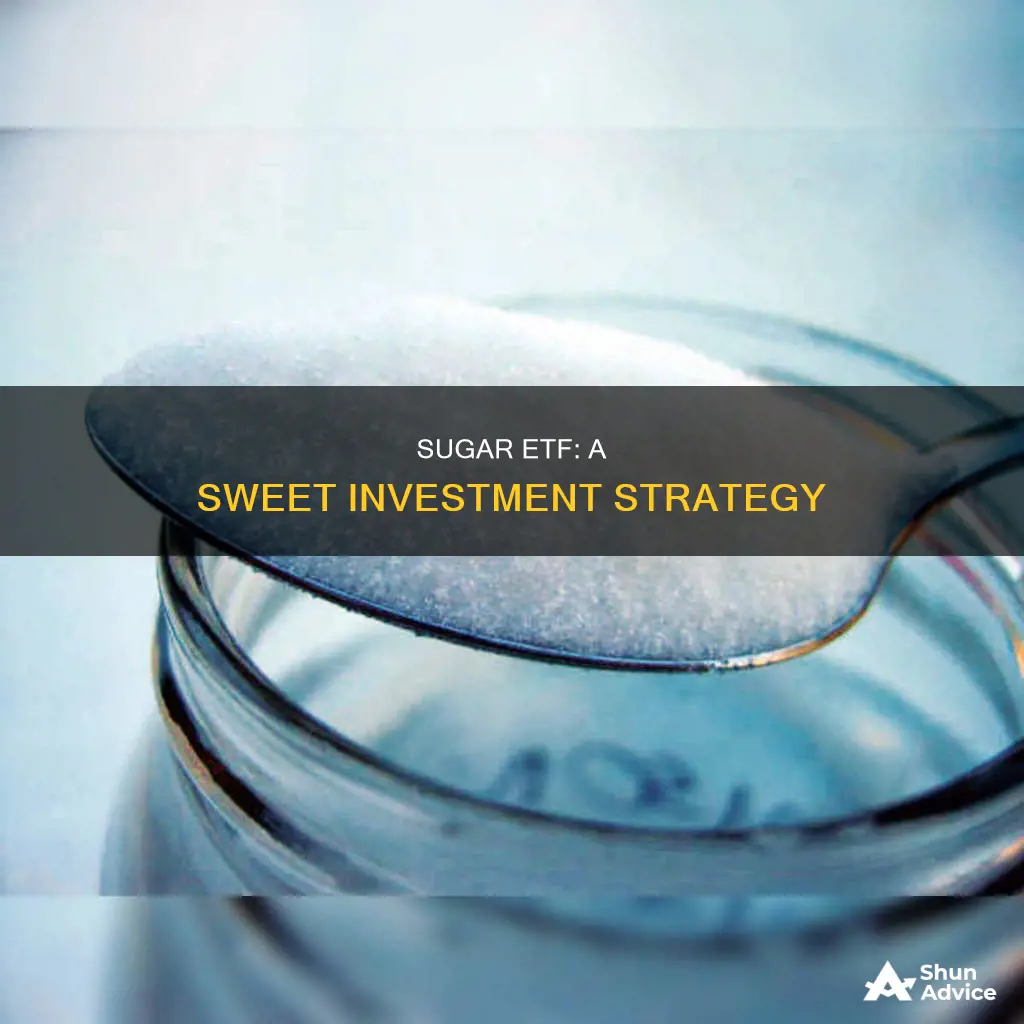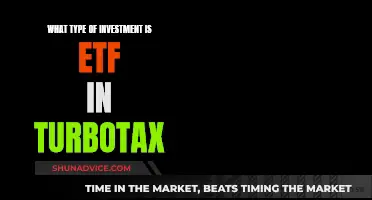
Sugar ETFs allow investors to gain exposure to sugar futures without needing a complicated futures account. They are a less risky investment strategy than investing directly in sugar, as they track the price changes of sugar. When choosing a Sugar ETF, it is important to consider the holdings of the fund, the total value of the assets, and previous performance. Some popular Sugar ETFs include iPath Series B Bloomberg Sugar Subindex Total Return ETN (SGG), Teucrium Sugar Fund (CANE), and iPath Pure Beta Sugar ETN (SGAR). It is also possible to buy stocks in companies that sell or are involved in the production of sugar, such as Tootsie Roll Industries, Hershey's, and Coca-Cola.
| Characteristics | Values |
|---|---|
| What is an ETF? | Exchange-traded funds (ETFs) are "bundles" of stocks that trade together as a single unit and follow a common theme. |
| How does it work? | ETFs trade as shares on exchanges the same way that stocks do. But unlike stocks, they offer access to a variety of assets without needing to put all of your money into one or two companies. |
| Why choose an ETF? | ETFs allow investors to minimize risk by diversifying while also taking advantage of the performance and general popularity of a particular sector. |
| Popular Sugar ETFs | iPath Series B Bloomberg Sugar Subindex Total Return ETN (SGG), Teucrium Sugar Fund (CANE), iPath Pure Beta Sugar ETN (SGAR) |
What You'll Learn

Sugar ETFs vs direct investment
Sugar is a widely exported consumable product with a consistent market, despite shifts in consumer trends. As an agricultural commodity, it is subject to various influences, including climate and weather conditions, and political and economic conditions. As such, investing in sugar carries a certain level of risk.
When considering how to invest in sugar, there are two main options: Sugar ETFs (Exchange-Traded Funds) or direct investment in sugar stocks.
Sugar ETFs
Sugar ETFs allow investors to gain exposure to sugar futures without the need for a complicated futures account. These funds track the price changes of sugar and can be an effective way to invest in sugar indirectly. ETFs are "bundles" of stocks that trade together as a single unit and follow a common theme. Sugar ETFs might invest in futures contracts for sugar or agricultural projects that produce or refine sugar.
The advantages of investing in Sugar ETFs include:
- Lower risk: ETFs provide a less risky investment strategy than direct investment, as they are less volatile.
- Ease of investment: Sugar ETFs do not require a complicated futures account, making them more accessible to investors.
- Diversification: ETFs allow investors to gain exposure to a range of companies involved in the sugar industry, rather than investing in individual stocks.
- Benchmark for sugar as an asset class: Some ETFs, like the iPath Series B Bloomberg Sugar Subindex Total Return ETN/ETF, aim to present sugar as an asset class and provide returns through futures contracts.
Some popular Sugar ETFs include:
- Tecruium Sugar: This ETF reflects everyday changes in the NAV of Teucrium's shares, which are influenced by the sugar market. It focuses on future delivery through weighted average prices of closing settlements for sugar futures contracts.
- Wisdom Tree Sugar ETF: This ETF is for investors seeking exposure to the sugar commodity and diversification across a broad range of industries.
- IPath Series B Bloomberg Sugar Subindex Total Return ETN/ETF: Listed on the New York Stock Exchange, this ETF provides investors with exposure to the sugar market through the Bloomberg Sugar Subindex Total Return.
Direct Investment in Sugar Stocks
Direct investment in sugar stocks involves purchasing shares of companies directly involved in the production, manufacturing, or processing of sugar. This approach allows investors to have more control over their portfolio and align their investments with their personal preferences or beliefs.
The advantages of direct investment in sugar stocks include:
- Customization: Direct investment allows investors to choose specific companies or sectors to invest in, avoiding overexposure to certain areas.
- Potential tax advantages: Investors can reduce their tax bill by selling underperforming stocks to offset gains, which is a simpler process with direct investment than with ETFs.
Some popular sugar stocks include:
- Cosan S.A. (NYSE: CZZ): A Brazil-based conglomerate with operations in sugar and ethanol production, fuel distribution, and natural gas pipelines.
- Bunge Limited (NYSE: BG): A global agribusiness and food company with operations in various segments, including sugar and consumer oils.
- The Hershey Company (NYSE: HSY): A leading manufacturer of chocolate and confectionery products that relies on sugar as a primary ingredient.
- Tootsie Roll Industries (NYSE: TR): Best known for its line of Tootsie Roll products, this company also offers other confectionery items like Junior Mints and DOTS.
The decision between investing in Sugar ETFs or direct investment in sugar stocks depends on the investor's preferences, risk tolerance, and investment goals. Sugar ETFs offer a less risky, more diversified, and accessible option, while direct investment provides greater customization and potential tax advantages. It is essential to consult with a financial advisor before making any investment decisions to ensure that the chosen investment strategy aligns with your financial goals and risk tolerance.
Saudi Arabia ETF: A Guide to Investing
You may want to see also

How to pick the right Sugar ETF
Sugar ETFs allow investors to gain exposure to sugar futures without the need for a complicated futures account. These funds track the price changes of sugar.
- Compare recommendations that fit your investing style and preferences for benchmarking indices. Consider the holdings of the fund, the total value of assets, and previous performance in your analysis.
- Consider the level of risk you are comfortable with. Direct investment in agricultural commodities like sugar is riskier than an indirect investment in exchange-traded futures of companies involved in the sugar industry.
- Power rankings of sugar on the commodities market can provide a sense of trends within the sugar industry. For example, EFTBF.com ranks sugar 18th in three-month fund flow, 10th in the average three-month return, and 19th in the aggregate AUM.
- Consider the investment objective of the fund. For example, the Teucrium Sugar ETF and the iPath Series B Bloomberg Sugar Subindex Total Return ETN/ETF aim to invest in Benchmark Component Futures Contracts under normal market conditions.
- Consider the range of commodities the ETF invests in. For example, the Wisdom Tree Sugar ETF is classified in the financial sector, but it trades commodities including but not limited to sugar.
- Consult with a financial advisor to determine which sugar ETF is the best fit for your financial investment needs and current portfolio.
TD Direct Investing: Are There Charges for ETFs?
You may want to see also

Sugar ETF Power Rankings
Sugar ETFs allow investors to gain exposure to sugar futures without the need for a complicated futures account. These funds track the price changes of sugar.
Teucrium Sugar Fund (CANE)
Teucrium Sugar Fund is a sugar-focused ETF that holds futures contracts of sugar, allowing investors to gain exposure to the price movements of sugar without directly dealing with physical commodities. The fund seeks to have the daily changes in the Shares' NAV reflect the daily changes in the price of sugar for future delivery, as measured by the Teucrium Sugar Index.
Wisdom Tree Sugar ETF
Wisdom Tree Sugar ETF is recommended for those who wish to diversify with exposure to the sugar commodity. It is classified in the financial sector under miscellaneous financial services and is an equity-based ETF in the United Kingdom market. The principal activity of the fund deals with short and leveraged commodity contracts and classic and longer-dated commodity contracts.
IPath Series B Bloomberg Sugar Subindex Total Return ETN/ETF (SGG)
SGG is an agricultural exchange-traded fund listed on the New York Stock Exchange with a focus on the sugar commodity. The ETF expense ratio is 0.45% with a dividend yield of 0%. It provides investors with exposure to the sugar market through the Bloomberg Sugar Subindex Total Return, reflecting the returns available through futures contracts on companies involved in the growth, harvest, manufacture, or distribution of sugar.
IPath Pure Beta Sugar ETN (SGAR)
IPath Pure Beta Sugar ETN is another popular ETF that invests in Sugar No. 11, the benchmark in the raw sugar trade based on a futures contract for the physical delivery of raw cane sugar.
Other Considerations
When choosing a Sugar ETF, it is important to consider your current portfolio and the type of diversification you wish to add. Compare recommendations that fit your investing style and preferences for benchmarking indices. Consider the holdings of the fund, the total value of assets, and previous performance. Additionally, sugar is a cyclical agricultural commodity that is subject to various influences such as climate, weather, political and economic conditions, which can impact production volumes and prices.
China ETF: A Guide to Investing in the Dragon's Economy
You may want to see also

Sugar ETF contract specifics
Sugar ETFs allow investors to gain exposure to sugar futures without needing a complicated futures account. These funds track the price changes of sugar.
Sugar ETFs are a form of exchange-traded fund (ETF) that specifically focuses on the sugar market. They are designed to provide investors with a way to invest in sugar without the complexities of a traditional futures account. Here are some key specifics about sugar ETF contracts:
- Underlying Asset: Sugar ETFs typically track the performance of sugar futures contracts or invest in companies directly involved in the sugar industry, such as agricultural projects that produce or refine sugar.
- Diversification: Sugar ETFs offer investors a way to diversify their portfolios by adding exposure to the sugar market, which is influenced by factors such as weather conditions, agricultural practices, and international trade policies.
- Risk Profile: Sugar is a cyclical agricultural commodity that is subject to various influences, including climate, political and economic conditions, and consumer trends. Investing in sugar ETFs is generally considered less risky than direct investments in sugar companies, as ETFs provide exposure to a basket of sugar-related assets.
- Performance Metrics: When evaluating sugar ETFs, it is essential to consider various performance metrics. This includes fund flows (capital inflows and outflows), average three-month returns, aggregate assets under management (AUM), expense ratios, and dividend yields.
- Popular Sugar ETFs: Some popular sugar ETFs include Tecruium Sugar, Wisdom Tree Sugar ETF, iPath Series B Bloomberg Sugar Subindex Total Return ETN/ETF (SGG), and Teucrium Sugar Fund (CANE).
- Contract Specifications: Sugar futures contracts specify the quantity, delivery months, trading hours, and value of the underlying asset. For example, the No. 11 (World) sugar contract calls for the delivery of 112,000 pounds (50 long tons) of raw cane centrifugal sugar.
- Benchmarks: Sugar ETFs are often compared against benchmarks such as the Bloomberg Sugar Subindex Total Return, which reflects the returns available through futures contracts on companies involved in the sugar industry.
- Geographic Focus: Sugar production is concentrated in specific regions, including South America, Southeast Asia, and the United States. Sugar ETFs may focus on specific geographic regions or provide global exposure to the sugar industry.
Carbon Credits ETF: A Smart Investment Strategy
You may want to see also

Sugar ETF diversification
Sugar ETFs are a good way to gain exposure to the sugar industry without the need for a complicated futures account. They are also a less risky investment strategy than direct investment in sugar, as they are less volatile.
There are three main types of sugar stocks to consider when investing: agricultural companies, consumer goods companies, and sugar ETFs.
Agricultural companies are involved in the direct production, manufacturing, or processing of sugar. The largest of these companies are outside the United States. An example of a large agricultural company is Cosan S.A., a Brazilian multinational conglomerate with a diverse range of operations, including sugar and ethanol production.
Consumer goods companies that rely on sugar as a primary product ingredient can also be classified as sugar stocks. Changes in sugar prices can influence these companies, as sugar shortages can cause problems in their supply chain. An example of a consumer goods company that uses sugar in its products is Hershey's.
Sugar ETFs are "bundles" of stocks that trade together as a single unit and follow a common theme. They might invest in futures contracts for sugar or agricultural projects that produce or refine sugar. An example of a sugar ETF is the Teucrium Sugar Fund, which holds futures contracts of sugar, allowing investors to gain exposure to the price movements of sugar without directly dealing with physical commodities.
To choose the right sugar ETF, consider the holdings of the fund, the total value of assets, and previous performance. It is also important to keep up with international news and track how changing economic and political climates influence sugar demand and production, as sugar is a globally traded commodity.
ETFs for Tech: Direct Investment Strategies
You may want to see also
Frequently asked questions
Sugar ETFs allow investors to gain exposure to sugar futures without needing a complicated futures account. These funds track the price changes of sugar.
This depends on your current portfolio and the type of diversification you want to add. Compare recommendations that fit your investing style and preferences for benchmarking indices. Consider the holdings of the fund, the total value of its assets, and its previous performance.
Teucrium Sugar Fund (CANE), iPath Series B Bloomberg Sugar Subindex Total Return ETN (SGG), and iPath Pure Beta Sugar ETN (SGAR) are all popular ETFs that invest in sugar.







